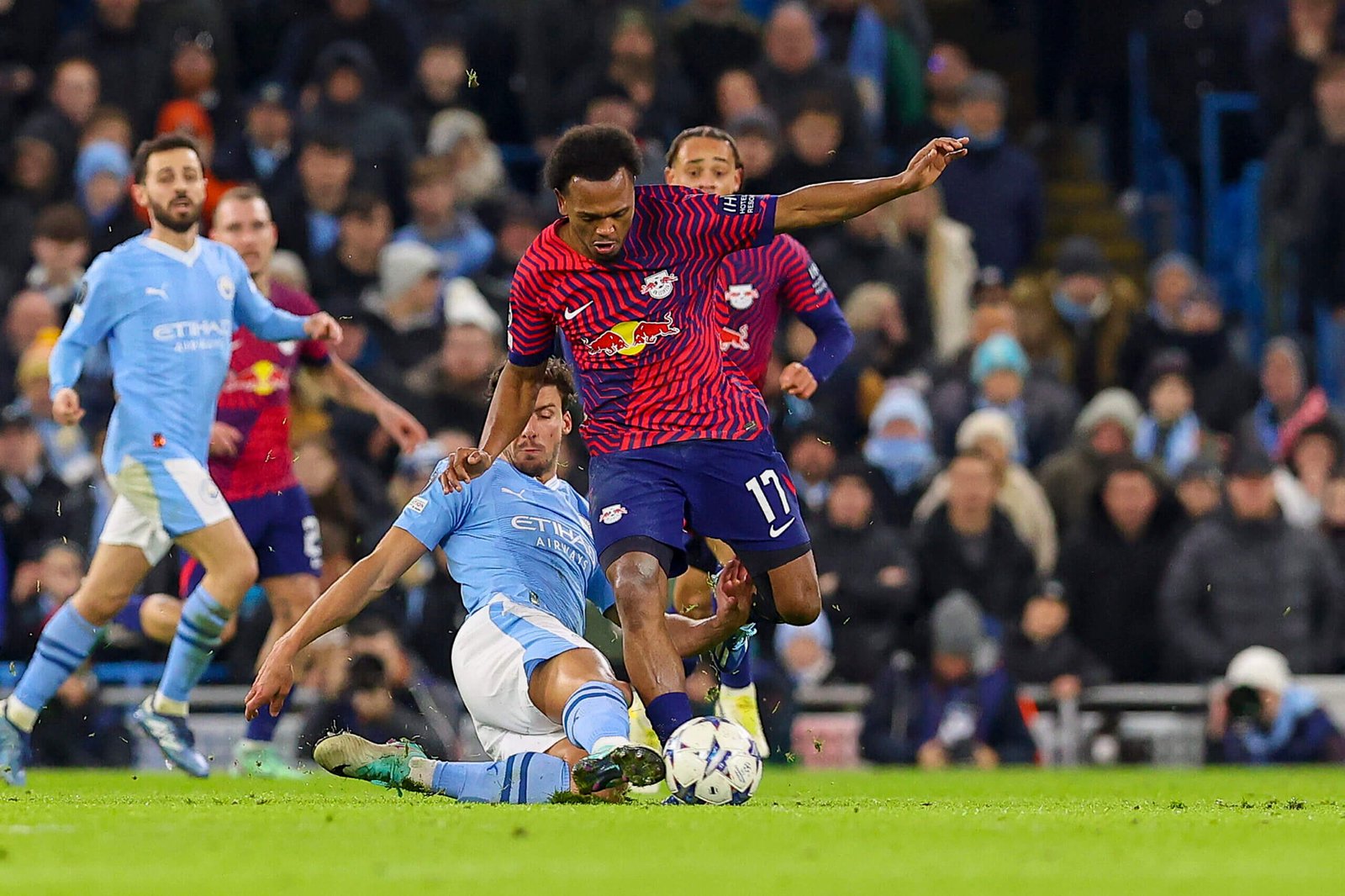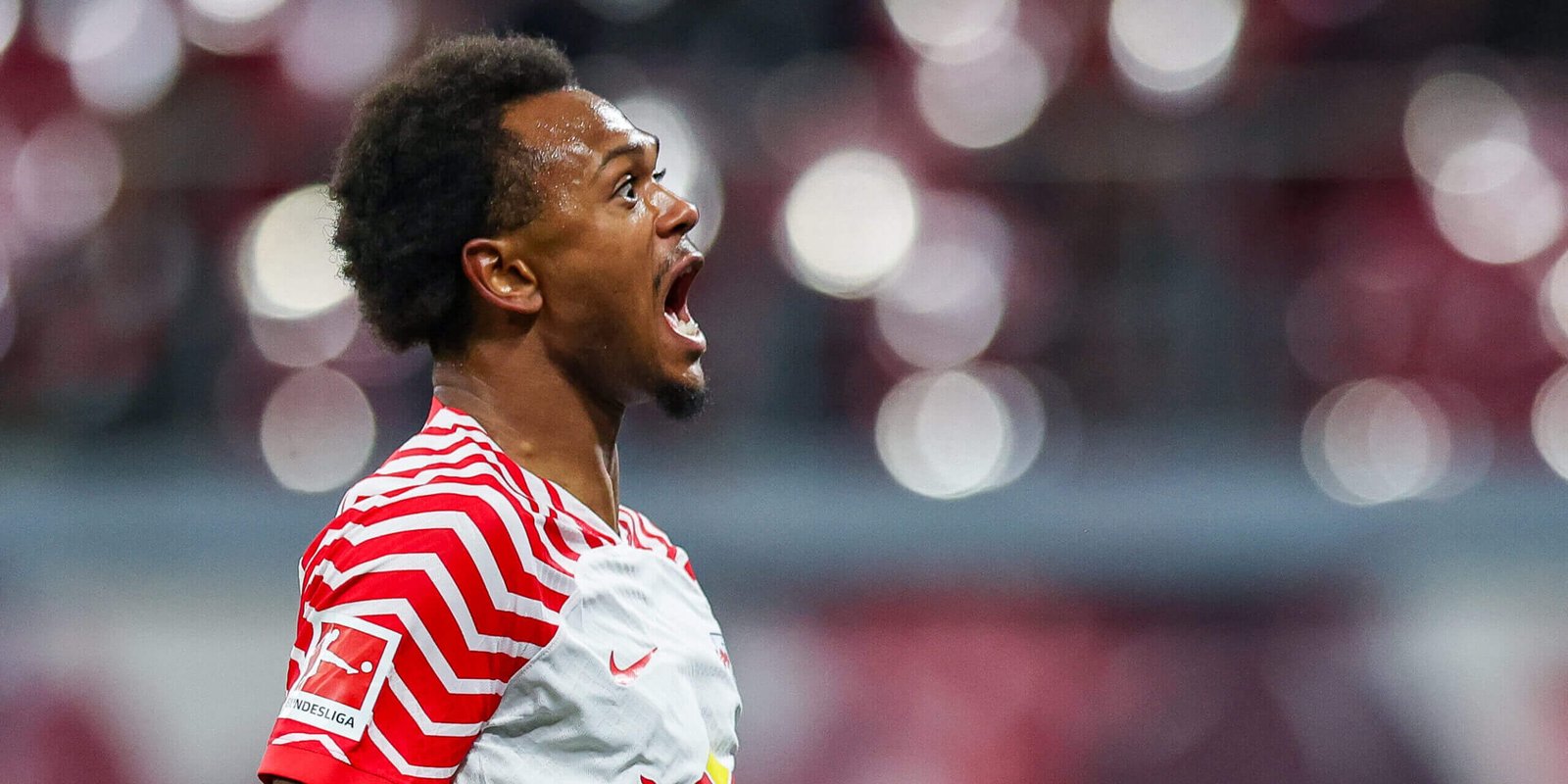Lois Openda is flying.
Halfway through his first season at RB Leipzig, he has scored 11 times in 17 Bundesliga games with four further goals in the Champions League. At 23, Openda is making good on the €38.5million (£33m; $41.9m) fee that brought him to Germany from Lens in the summer of 2023.
It was a move he wanted. It was one he knew could work.
“If you look at how they play the game and how they defend and attack,” he tells The Athletic, “that playing style has a really good connection with my profile as a player.”
So far, that has proven the case. Openda is a fleet-footed forward who can break beyond defenders, change direction sharply and is quick to shoot. It is not a surprise that Leipzig’s football, with its vertical purpose and rhythmic intricacy, has suited him so well. He has four assists alongside his 11 Bundesliga goals and is actually averaging more chances created from open play per game than Harry Kane (1.26 to 1.15).
He is part of their side, as well as being its sharpest edge.
The Belgium striker celebrates scoring against Manchester City at the Etihad Stadium in November (Martin Rickett/PA Images via Getty Images)
Nevertheless, Leipzig are in the midst of a strange season. Head coach Marco Rose is now in his second year and, having lost key players Christopher Nkunku, Dominik Szoboszlai, Josko Gvardiol and Konrad Laimer over the summer, his team remains under construction. Some of their football has been good. Most of their results have been, too. But they are not quite running on full power.
Despite that lack of momentum, Openda has shown himself to be a quality goalscorer whether with his right foot, his left or his head. He may not be the most efficient forward in Germany — he is averaging a goal roughly every nine shots, compared to Serhou Guirassy’s four — but he is among the most menacing.
He looked immediately comfortable at his new club, too. His competitive debut was the 3-0 Super Cup victory over Bayern Munich, on the night that was supposed to be about Kane’s arrival in Germany. It was memorable instead for just how ruthless Openda, Dani Olmo and Xavi Simons were and how they diced Bayern up in the game’s transitions.
Openda chuckles at the memory. “We had tough pre-season.”
But their superior conditioning certainly showed that night. As did the instant chemistry between Openda and his new attacking teammates.
“I’ve had that connection with Xavi (Simons) since the beginning,” he says. “But I can’t just say that about one player. With Yussy (Poulsen) and with (Benjamin) Sesko, the connection is good. And I played with Timo (Werner) at the beginning of the season, too.
“It’s not difficult to play with the other players, because everybody has a good mentality and wants to help each other. The coach is really intelligent. He knows where to put players. All the young guys here enjoy the game and play in a system where we can show our quality.”
The atmosphere Openda describes is healthy and self-policing. Over the winter break, Leizpig sold Emil Forsberg, one of their longest-serving players, to New York Red Bulls in MLS. The dressing room is certainly getting younger but, the Belgian says, accountability on the training pitch is maintained by veteran players.
“Players like Peter (Gulacsi) are there and always good to us. And we have others who have been there from before, and they’re always showing us the right attitude to have. Even if you have a good attitude, how can you be better?”

Yussuf Poulsen and Openda take instruction from Rose (Ralf Ibing – firo sportphoto/Getty Images)
He credits Rose and the coaching staff with creating that environment — one which has enabled him to adapt quickly.
“It’s not easy to go from Belgium to France, France to Germany. Everything’s different. The language. Everything. But from the first day, I was made to feel at home. The way they’ve taken care of me since has been perfect. Then my job is just to play football and to enjoy myself on the pitch.”
He has looked like a player at ease. But he has had difficult moments. Openda scored on his Bundesliga debut, in a 3-2 defeat to Bayer Leverkusen, but made a mess of a late chance to equalise, hitting the post with the goal unguarded. It was ugly. The video of his miss became a point-and-laugh story in a German tabloid that weekend.
But Openda recovered from any bruising to his ego and has flourished since, scoring plenty of goals. When asked about his favourite from the season so far, his mind goes to his second against Manchester City in the Champions League: a long run, a beautiful turn, and a sweet finish at the Etihad in November.
“To go in and out… yeah, it was a good goal,” he says, smiling coyly. “But to score against City was so important for me.”
Openda undersells his contribution that night. His first goal came from a breakaway after he pinned Manuel Akanji on the halfway line and raced away to score. A lovely finish. The second, the one he remembers more fondly, saw him ease Ruben Dias off the ball and, later, tie Gvardiol in a knot. A £150m trail of defenders, left in his wake.
What left a real impression was how he used his body first to unbalance those players and, then, protect the ball from them.
Particularly because, in person, Openda is slighter than he looks on television. Yet in possession he has a muscularity that prevents tacklers from dispossessing or taking away a shooting angle. His game’s more obvious tenets are skill and speed — he has plenty of both — but that strength is not to be overlooked.

Openda evades Ruben Dias’ lunge in November (Ryan Crockett/DeFodi Images via Getty Images)
Not that he’s looking to be underestimated; Openda has plenty of ambition and is clear-eyed about his future.
“I want to be a top player,” he says. “I want to play for the best teams in the world. And I believe Leipzig can help me get there.”
His trajectory is certainly pointing in that direction now, but his growth has not always been linear.
As a teenager, Openda was a known name. He appeared on lists and scouting reports, generally alongside a big tick. Born in Liege, he grew up idolising Didier Drogba. “I loved how he scored goals, made assists and protected the ball at Chelsea,” he says. “I was always, always watching him.” He was a star of Belgium’s international youth teams and remains the under-21s’ record goalscorer.
When he was 15, he joined Club Brugge’s academy. Three years later, he made a first-team debut. But a prosperous first season became a goalless and difficult second. At the beginning of his third year, facing competition from, among others, Bas Dost, Noa Lang and Charles De Ketelaere, he chose to move away from Belgium for the first time, joining Vitesse on loan in the Dutch Eredivisie.
One year became two. There were 28 league goals in two seasons, and Openda has been playing with confidence and scoring at a steady beat since. When his loan in the Netherlands finished, Club Brugge sold him to Lens for €15million; 21 goals in his first and only season in France were then enough to convince Leipzig of his pedigree.

Openda in Lens colours after scoring against Ajaccio (Christian Liewig – Corbis/Corbis via Getty Images)
So far, his career has been well plotted. Just as with his eventual move to Germany, the decisions that led him there were made with his family. The result has been a smooth upward curve and a sense of sustainable progress.
“I think I’ve always made good moves in my career,” he says.
“I was at Club Brugge, but I needed minutes on the pitch, so I moved to Vitesse Arnhem. And for me, those two years were really top. I got my confidence back and then I decided to go to Lens, again to get a lot of confidence and to score goals. Lens was a top team. And now RB Leipzig is a top team and the perfect place for me to progress.”
Confidence, progress; these are words Openda uses a lot. Hearing him talk about the various stages of his career, it sounds like each step has been made with the purpose of preparing him for whatever comes next.
In the Bundesliga, that will be Leverkusen. On Saturday night, Xabi Alonso’s side will head east to the Red Bull Arena and the story will be whether they can remain perfect and on course for the title.
But this is a dangerous game. And, for sure, Lois Openda is becoming a very dangerous opponent.
(Top photo: Jan Woitas/picture alliance via Getty Images)
Read the full article here


